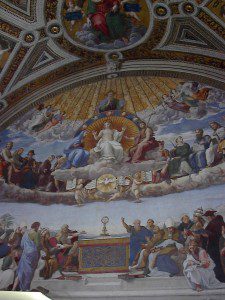 Extraordinary claims require extraordinary evidence.
Extraordinary claims require extraordinary evidence.
This is a true as far as it goes, except extraordinary things happen all the time. It is extraordinary (in one sense of the term) that you are reading something I am writing. What are the odds? The moment one asks for the definition of terms like “extraordinary” and “evidence,” the problems appear.
Atheists think of the God hypothesis or miracles as “extraordinary” and so requiring amounts of evidence that are impossible to achieve. Take for example a weeping icon. The Orthodox faith does not depend on any particular icon weeping. In fact, weeping icons are not necessary to our theology. If no icon wept, Orthodoxy would still be Orthodoxy.
Yet icons weep. If you are a Christian, you accept that bad people defraud the faithful with fakery and tricks. This happens. We also know good people, who are sincere, who experience weeping icons. We believe until we are given reason not to do so. Why? If God exists, then there is nothing remarkable about weeping icons! We do not believe in God because icons weep, but because we believe in God, the evidence needed is not so great.
An atheist has a problem. If atheism is true, no icon can ever weep. All miracles must be fakes or explainable on natural grounds. An atheist will take any natural explanation, no matter how improbable, over a supernatural explanation. When it comes to miraculous healings, such discussions can become absurd. Tell an atheist of a person with an incurable disease who is instantly and forever healed of that disease immediately after prayer and this will be put down to coincidence or lies.
Did Jesus rise from the dead? If Jesus was the Son of God, this is not an extraordinary event, just an awesome one. I would expect the Son of God to rise from the dead! Jesus’ miracles, his life, and his teaching
An atheist might retort that Christian beliefs are circular and so fallacious. We believe in miracles because we believe in God, but the experience of miracles strengthens our belief in God. The empty tomb should have been predictable for the apostles from our Lord’s teachings, but they only understood those teachings after He was raised from the dead.
In fact, we should begin by saying circular arguments are not bad in themselves. Any truth of mathematics or proof of logic is circular. The conclusion implies the premise. It is only ignorance of the implications of the premises that make the conclusion surprising to us. Informally, we rightly condemn rhetoric that uses arguments in vicious ways, that hide the circularity, but a big enough set of ideas, a worldview, will cohere.
If truth is unified, then knowing even a single truth implies every other truth. Humans simply cannot see the implications. Our beliefs cohere like a great web, to borrow an image from the philosopher W.V. Quine. Some of our beliefs connect to our external experience, but other beliefs are based on those experiences in tangential ways.
Our web of beliefs cohere and should be logically consistent. There is good reason to think more than one “worldview” or set of beliefs could be developed to explain the world. I believe Jesus is risen in part based on external evidence, in part based on personal experience of Jesus, and in part on other beliefs that make the life of the Savior rational.
What of “evidence” then?
Not just any web of beliefs can survive contact with life. Philosophies come and go. Even a successful set of ideas, like Platonism, must change over time to adapt to new experiences and competing ideas. If the struggle to make our “web work” becomes great enough, we can and should look for a different worldview or religion.
Christianity is (in this way) like any other sophisticated and old web of beliefs. We have grown, changed, adapted and will continue to do so. We care about evidence, but we also interpret evidence to fit our basic ideas.
Everyone, including an atheistic materialist, will do this. The result should be humility when it comes to my own certainty. I am a theist, because I am fairly sure God exists. I am a Christian (in part) because Christianity makes the best sense of my theism. I am Orthodox, because that is the best set of explanations I have found for Christianity.
Am I sure I am right? I am sure enough to base my life on these ideas, but not to the point of arrogance. I live my life by faith that is open to challenge. I am a skeptical believer. To believe is not to know for sure, but to put provisional confidence in it and that is one sense of faith.
It is acceptable to believe a thing merely because you wish to do so, if it does any work at all in your worldview. If what we have been discussing is correct, we begin in belief and only use skepticism when we must. Assuming there is no good reason to doubt it, we believe what flows from our general worldview, Orthodoxy. On the other hand, it is bad to doubt a thing for which there is some evidence merely because you wish it were not so.
Orthodoxy becomes a call to wonder. We are part of a splendid web of beliefs that answer many questions for us, so we can move on to wonder about better questions. Orthodoxy does not end speculation, but frames a door to lead to further wondering.
To be skeptical can be toxic, but it is joyful to be full of wonder. Our secular culture has presented “religious orthodoxy” as if it kills wonder. In certain forms of religious “fundamentalism,” it does do this. We learn truths and simply repeat them. To an Orthodox believer, however, settling one question leads to one hundred more and this is a joy.
We are the church of wonder.











